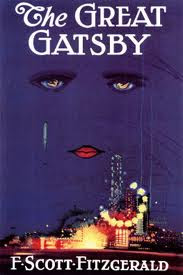In feverish anticipation of the movie, I read
this acclaimed book. I know it sounds shallow to read a book just to prepare
for a movie-adaption, but it’s so fitting given the main themes of the book.
With “Love is Blindness” ringing in my ears, the trailer playing in my mind’s
eyes, the reading experience was way more dramatic and sweeping than the book
itself inspires.
Jay Gatsby is a mysterious millionaire shrouded in enigma. He yearns and cultivates a dream so fantastical, so pure, so unreal that it represents the collective American dream of the 1920s to pursue the “unreal”. In the age-old clash of idealism against cruel reality, loyalty against selfishness, the dream crumbles and emphasizes the beginning of hedonism and moral deterioration of a materialistic world of excesses.
Jay Gatsby is a mysterious millionaire shrouded in enigma. He yearns and cultivates a dream so fantastical, so pure, so unreal that it represents the collective American dream of the 1920s to pursue the “unreal”. In the age-old clash of idealism against cruel reality, loyalty against selfishness, the dream crumbles and emphasizes the beginning of hedonism and moral deterioration of a materialistic world of excesses.
Almost everybody has been edified on all the
various social and moral symbols pervading the novel. The sudden wealth and
economic boom after the first World War saw America burgeoning with so much
materialism that it loosened the social morals of the middle and upper
social-strata. The American dream turned into something wholly greedy and
selfish. With the swarm of such ambitions and vapid pleasure seeking, the
disparity between the social classes widened, and everyone wanted to imbue and
realize the dream at any cost. When such ambitions consume one, nobler feelings
compete with the brasher ones, and the pursuit is romanticized as something one
dearly wishes it represents than what it really is. This is the core of the
whirlwind drama that tells the familiar story of the careless rich and the
trampled poor. These themes are familiar enough for us today because of the innumerable books and movies that have been cloned and inspired from an original piece such as this. Reading the book from that perspective helps to appreciate the author's foresight and insight.
The deeply buried and half-dead romantic in
me still gets swept and swayed by stories and characters that idealize and
romanticize romanticism just for the sake of it. Jay Gatsby is an
impressionable character whose personality is an endearing set of
contradictions that make him an aggressive, mindlessly ambitious idealist. All
the characters are memorable for the deft ways in which they are given their
personalities with so few words. The author is extremely economical with his
words (my perpetual aspiration). Everything is expressed with incisive sarcasm,
insight, and beauty. Sometimes, the brevity and incisiveness result in a few
vague phrases. The other downside to the writing was the sudden shift between
scenes, the impulsive (sometimes flighty) dialogues, and the rapid rush to the
end. It all seems too sudden to take in, too unbelievable to let the weight
sink in. You need some time to let the book touch you. This makes the book constantly
alternate between being a satire and a serious drama. Perhaps the writing
itself represents all the contradiction and moral conflict of that era.
As I mentioned, the movie and its dreamy lead
may have had a strong bias in my reading experience! But I enjoyed reading it
and would recommend it.

No comments:
Post a Comment